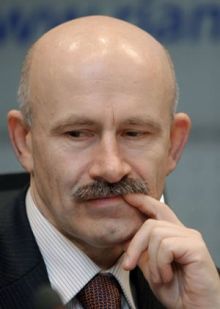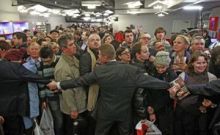These days, a bookstore Moskva on Vozdvizhenka Street in Moscow hosted a meeting with the first USSR president Mikhail Gorbachev. The event was organized to present his book Alone with Myself. The book, dedicated to the memory of Raisa Gorbacheva, describes events that led Gorbachev to the most important post in the Soviet Union. During the presentation, the former president of the USSR promised to write a sequel titled After the Empire. The Day addressed Gorbachev’s interpreter Pavel Palazhchenko, who has been continually working for Gorbachev since 1985, with a request to comment upon the publication of these memoirs, since the whole world now is interested in the atmosphere of those times, and share his impressions of the presentation.
“Indeed, it can already be said that the release of Alone with Myself became an important event. The bookstore Moskva was crowded during the presentation. A large number of young people present at the event also gladdened the eye. About 700 copies of the book were sold during that day, which became a record for the store. And perhaps, a lot of people purchased a book beforehand, because there was a large crowd of readers willing to receive an autograph, about a thousand of them. And Mikhail Gorbachev said a few words to almost every single one of them. The event was over around midnight.”
We supposed that this book might become a worldwide bestseller. Will it be as popular in Russia?
“Moscow bookstores have just started selling the book, its presentation is going to take place in Saint Petersburg soon, it is being ordered by bookstores from other cities. At the moment, there have been 10,000 copies printed, but I am sure that much more will be needed to satisfy the demand. Besides, millions of readers will be able to read extracts from the book in the newspapers Komsomolskaya Pravda, Moskovsky Komsomolets, Nezavisimaya Gazeta, and Novaya Gazeta. But the popularity of the book is not the most important thing. The readers, along with Gorbachev (he wrote this book without any help from literary editors), now have an opportunity to recall that time, ponder over it, comprehend the events that happened then, and make some personal conclusions.”
In the photo on your Facebook page we can see that you were present at the meeting of George H.W. Bush, James Baker, and Mikhail Gorbachev, which took place on November 1 in Houston. What are your impressions of the meeting?
“The meeting was warm and far from the ‘memoir’ type. Politicians of such level and with their amount of experience cannot refrain from talking about the present-day state of affairs and problems. They are concerned about a number of matters. These people put an end to the cold war, but there is a feeling that not all the opportunities which were discovered at that time were put to use. As a translator, I find it not appropriate to retell the discussion, I can only say that I did not feel bored once during the 90-minute-long conversation.”
One of Facebook users wrote on your page: “Thanks to Gorbachev for all he has done to help us get out of slavery. He is an outstanding person!” Why, in your opinion, such opinions are rare in Russia? Is there a demand in Russian society for the real evaluation of what Gorbachev has done for the country and for the world in general?
“I cannot agree with the statement that such reviews are rare. More and more of them are appearing with time. Gorbachev is getting more and more recognition as the person who made crucial steps to establishment of freedom and democracy. And there definitely is demand for the unbiased evaluation of Gorbachev and his era among the thinking part of the Russian society.
“It should be said that Gorbachev does not bear a grudge against people, including those who have not yet come to a more positive evaluation of his actions. It should be kept in mind that the 1990s were very hard for the majority of the country’s population, and there is no wonder that people started looking for someone to lay all the blame on, and found Gorbachev. But as time passes, people get smarter (not all of them, of course), new generations come along. ‘Great things are better seen from a distance.’ With the lapse of time, the appraisal of Gorbachev by Russia and by the international community (the latter is already known) should draw closer together. Otherwise, our country is doomed to isolation, or just doomed in general.”
Why do present Russian government and ruling elite not want to pay tribute to Gorbachev? Some Russian experts say, by failing to do this, they demonstrate inability to adequately evaluate the course of historical development.
“I cannot say that I have a favorable opinion of the present Russian ‘elite,’ but there are a lot of people in there who recognize and respect Gorbachev. I receive evidence of that every year on Gorbachev’s birthday. He receives a huge number of calls, letters, and telegrams. It seems to me that a lot of these greetings are quite conscious and sincere.
“Concerning the government, on his 80th birthday, Gorbachev was awarded with the highest state decoration, Order of St. Andrei Pervozvanny (Andrew the First-Called). And in my opinion, this demonstrates the government’s ability to sufficiently appraise Gorbachev’s role in history. Of course, Gorbachev preserves his right to criticize the government, and they might not like it, but they will have to put up with it. Sometimes Gorbachev scolds them, sometimes he defends them. Once I was present at his meeting with students who criticized the government and Gorbachev for defending them. And he said: ‘Those who have been a president, please raise your hand.’ Everyone fell silent. ‘But I was. And I know how hard it is.”
You have been with Gorbachev for 27 years. Despite all the offers, which were probably very advantageous, to work for Russian or perhaps even foreign government bodies, you stay his trustee, as you once stated in one of the interviews. What makes or binds you to maintain relations with a person who is considered to be a traitor in Russia, a person who is said to have ruined the Soviet Union?
“Concerning job offers, I had one of them: on December 20, 1991, I received a call from the then deputy foreign minister Avdeev. He said, they offered all foreign ministry employees who moved to the president’s office, to come back to the ministry. But the decision had to be made quickly, since the USSR foreign ministry’s days were numbered, soon everyone would say goodbye to their current positions, unless they took care of further employment. He said that if I decided to come back, they would complete all the formalities as soon as possible.
“Of course, such things deserve gratitude, and I was truly grateful to Avdeev. And though I did not have any certain plans, I told him that I could not use this invitation. I could not see myself as a part of Yeltsin’s entourage. After that, I have not received a single offer from Russian or foreign government bodies. And I did not apply anywhere either.
“I do not just ‘maintain relations’ with Gorbachev. I have been with him all these years not because of some obligations, but because of my personal convictions. Should I say that I consider accusations of Gorbachev of ‘treason’ and ‘breakup of the Soviet Union’ to be thoughtless and false? Especially when they come from people who did not lift a finger to preserve the Soviet Union, or intentionally or unwittingly promoted its breakup by their actions.
“It is obvious that it was impossible to preserve the country which united such different countries as Turkmenistan and Estonia, for example. But Gorbachev strived to preserve the highest possible level of integration and cooperation among republics. And the breakup itself could have been carried out with less damage. But the history cannot be rewritten. What’s done cannot be undone. Today, Gorbachev’s attitude towards independent Ukraine is the most well-wishing.”
What did you feel when at the end of one of the meetings where you were interpreting, with the senator Edward Kennedy, the latter said to Gorbachev: “You have a brilliant interpreter. Thank you”?
“It happened in 1985, at the very beginning of my cooperation with Gorbachev, and of course, I was flattered. It made me more confident of my abilities. Though, frankly speaking, I did not doubt myself even then.”
You have become a polyglot. Besides English, French is also your working language. You know Spanish, and you are learning Italian and German. And what about Ukrainian? Can it be considered half-European, as it was stated by the Russian ambassador Mikhail Zurabov in 2010?
“I do not know what Mr. Zurabov meant by that. I know him as an outstanding entrepreneur and conspicuous statesman, but not as a linguist. I can read Ukrainian without a dictionary, thanks God, but I do not dare speak. If I had an opportunity to stay in Kyiv for a few months (I visit the Ukrainian capital every once in a while, and I enjoy it every time), I think that gap would be filled.”
Judging by the last name, you, as well as Gorbachev, have Ukrainian roots. Could you feel that while talking to him, or in his work?
“My roots are a combination of a few nationalities, but Gorbachev’s mother was Ukrainian (by the way, Raisa Gorbacheva was hundred percent Ukrainian). Gorbachev likes Ukrainian sayings, humor, there are a lot of Ukrainian songs among his favorite ones. For his 80th birthday, we gave him a unique CD (there are only 10 copies of it) with his favorite songs. There are two songs performed by him: Temnaya noch (Dark Night) and Starye pisma (Old Letters), and a few more songs, including Dyvlius ya na nebo (I Am Looking at the Sky) performed by Aleksandr Malinin. He kept one copy of the CD, and gave the rest to his closest friends.”
You have a profound experience of studying foreign languages. Could you give a tip to The Day’s readers on the best ways to learn a foreign language?
“There is no easy formula for that. Do not believe people who tell you otherwise, they are just trying to fool you. It is true that every next language is easier to learn. But in the beginning, a great effort is required. I can advise you the following: when you start comprehending the written text more or less, read the news in your native language every day, and then read the same news in the language you are studying. The wording might be similar sometimes, but even if it isn’t, this exercise is still useful.”









